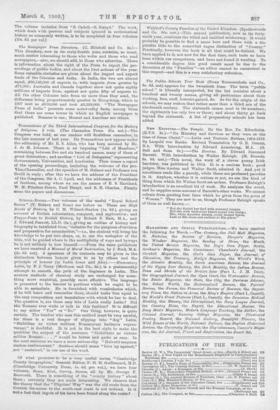SemooL-Boons.—Two volumes of the useful "Royal School Series" (T. Nelson
and Sons) are before us. These are High Roads of History, by C. M. Wilmot-Buxton (1s. 6d.), giving an account of British colonisation, conquest, and exploration ; and Finger-Posts to British History, by Robert S. Rait, M.A., and 3. Edward Parrott, LL.D. (2s.), giving an outline of history and biography in tabulated form, "suitable for the purposes of revision and preparation for examination,"—i.e., the student will bring his knowledge to be put into shape, or, to use the metaphor of the title, will be guided where in the multiplicity of ways and byways he is not unlikely to lose himself.—From the same publishers we have received A Manual of Moral Instruction, by J. Reid, M.A. (2s. 6d. net). A specimen of its contents may be given in the distinction between honour given to us by others and the principle of honour (in Latin honor and fides).—.Elementary Latin, by F. 3. Terry (Methuen and Co., 2s.), is a praiseworthy attempt to smooth the path of the beginner in Latin. The austere methods of classical study are exchanged for some- thing more empirical, possibly more effective. The language is presented to the learner in portions which he ought to bo able to assimilate. He is furnished with vocabularies which, if he will learn and remember them, should make him equal to the easy composition and translation with which he has to deal. The question is, are those easy bite of Latin really Latin P Did the Romans ever write or talk in this fashion P It is difficult to say either "Yes" or "No." One thing, however, is quite certain. The teacher who uses this method must be very careful, for there is a real danger of slipping into "dog" Latin. " Stabilitas ac virtue militum Romanorum barbaros supera- verunt " is doubtful. It is not in the best style to make the qualities the subject of the sentence. " Stabilitate ac virtute milites Romani . . • ." would be better and quite as easy. In the next sentence we have a more serious slip. " Helvetii magnam oladem sustinuerunt." Sustineo should mean "bore up against," not " sustained," in our use of the word.














































 Previous page
Previous page